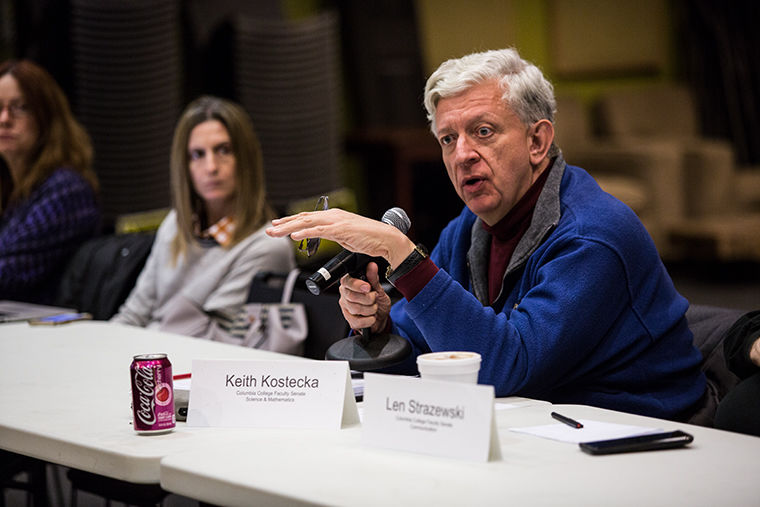Faculty Senate proposes new retirement plan
March 9, 2018

Keith Kostecka at Faculty Senate on March 9. at 618 S. Michigan Ave.
Faculty Senate will vote on a proposal for a “phased” retirement plan for faculty at its April 13 meeting.
The proposal, introduced March 9 by the Senate’s Financial Affairs committee, would allow eligible faculty to gradually reduce their workload over a two to three-year period in preparation for retirement.
During the meeting, held at the 618 S. Michigan Ave. Building, the Senate also called on the administration to propose a “discontinuation policy” that would describe how the college consults with faculty about eliminating academic programs.
Keith Kostecka, associate professor in the Science and Mathematics Department and chair of the financial affairs committee, introduced the retirement proposal which he said would help the retirement transition be less stressful for faculty and their academic departments and potentially save the college money, Kostecka said.
“This is something that would be beneficial to departments in terms of planning for faculty and give them the opportunity to leave in a more gradual way,” Kostecka said.
Senior Vice President and Provost Stan Wearden said during the meeting that he spoke with Vice President of Business Affairs and CFO Jerry Tarrer about the new motion and said he supports it.
“Having been a faculty member myself, I know that what we do academically is pretty all- encompassing in terms of our lives,” Wearden said. “Phased retirement is often a more graceful way for us to leave the institution [and] gives us a chance to decompress a bit and transition into that next phase of life. I also agree with the idea that it gives the department the opportunity for better transition.”
Wearden added that they will also have to examine the economic impact of this motion, such as how it could potentially affect benefits and pension plans. It is not known how much money the proposal might save.
Raquel Monroe, Faculty Senate president and associate professor in the Dance Department, said the department received a draft advisory letter from President and CEO Kwang-Wu Kim and Wearden that recommends the discontinuance of programs in creative arts therapy. This includes the MA in dance movement therapy and counseling, the dance movement therapy, including alternate route certificate and graduate Laban certificate in movement analysis, Monroe said.
The advisory also noted discontinuation of the college’s early childhood education program. Monroe did not mention why these programs may be discontinued.
“There is still not a discontinuance policy. The discontinuance policy committee met in September, but we have yet to meet again and we’ve expressed our frustrations about there not being a discontinuance policy partially when there are two programs on the chopping block for the discontinuance,” Monroe said.
Mark Rosati, vice president of Strategic Communications and External Relations, presented to the Faculty Senate how he plans to better improve communications to the media and the Chicago community to better tell Columbia’s story.
Rosati said since his start in October 2017, Columbia has quadrupled the number of news releases and has redesigned the college’s homepage.
“It’s been clear to me since literally my first day that we need to utilize all the communications channels to tell our story more aggressively,” Rosati said. “A lot of very good work has been done here in the communications sphere but we need to be much more.”







